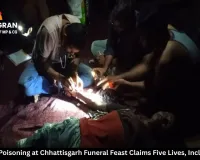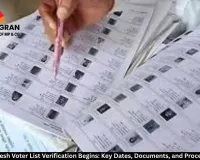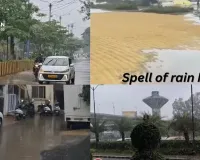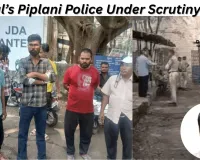Indore 'MD Drug' Bust Crumbles: ₹2 Crore Haul Revealed as Urea in Forensic Twist
Digital Desk

Police Blunder Sparks Probe as Lab Tests Expose Fertilizer Impostor, Raising Questions on Narcotics Operations.
In a humiliating reversal for the Indore police, a high-profile seizure touted as a ₹2 crore mephedrone (MD) drug haul has been unmasked as ordinary urea-based fertilizer. The revelation, confirmed by a state forensic lab, has triggered a court-mandated deeper investigation and calls for a central agency takeover, exposing potential lapses in one of Madhya Pradesh's busiest anti-narcotics units.
The botched operation unfolded on February 26, 2025, in Azad Nagar, a bustling suburb off AB Road Bypass. Tejaji Nagar police, acting on a tip-off via wireless, cornered two suspects—Vijay from Mandsaur and Mohammad Shahnawaz from Azad Nagar—fleeing on a motorcycle near Kasturba Gram. A quick search of Shahnawaz's pockets yielded 198 grams of white powder, which officers immediately labeled as commercial-grade MD under the Narcotic Drugs and Psychotropic Substances (NDPS) Act.
Sub-Inspector Manoj Dubey led the raid, backed by Head Constables Devendra Parihar and Abhinav Sharma, and Constables Govinda and Dipendra Rana. A seizure memo was drawn up on the spot, pegging the contraband's street value at ₹2 crore—well above the 50-gram threshold for stringent penalties. Shahnawaz's interrogation implicated Lakhan Gupta, a court munshi at Azad Nagar station, drawing him into the net. All three were slapped with charges under Section 8/22 of the NDPS Act, promising years behind bars.
What followed was a cascade of internal fallout. The Crime Branch, under former IPS officer Karan Singh's oversight, faced immediate scrutiny. Suspicions rippled through the ranks, leading to the sidelining of several Vijaynagar station officers, including Pramod Tomar, who was pulled from active duty. "This was supposed to be a landmark bust," said a senior police source, speaking off the record. "Instead, it's left us all questioning our procedures."
The powder's journey to the Forensic Science Laboratory (FSL) in Bhopal should have sealed the case. But the June 2025 report delivered a bombshell: no traces of mephedrone or any narcotic. Instead, tests identified potassium nitrate—a common ingredient in fertilizers, fireworks, and even toothpaste—mixed with urea traces. The innocuous chemical cocktail shattered the narrative of a major drug ring.
Doubts lingered, prompting Indore police to seek court approval for a re-test at the Central FSL in Hyderabad. The district court greenlit the move last week, while lambasting delays in acting on the Bhopal findings. "The investigation's integrity is at stake," the bench noted in its order, directing a thorough review of evidence handling and tip-off credibility.
For now, the accused remain in custody, their fates hanging on the central lab's verdict. ACP Aditya Patole's recent internal probe cleared some Vijaynagar personnel, but fresh allegations against senior brass have reignited tensions. "We've got to rebuild trust," Patole told reporters curtly, declining further comment.
This fiasco underscores broader challenges in India's narcotics enforcement, where high-stakes raids often hinge on field judgments amid resource strains. As Latest India News tracks this trending news story, questions mount: Was it sloppy science, planted evidence, or plain incompetence? With the case eyed for a central probe—possibly by the CBI—Indore's force braces for accountability. Reliable news updates suggest more heads may roll, turning a would-be triumph into a cautionary tale for public interest journalism on police accountability.
In the end, what began as a crackdown on Azad Nagar's shadows has illuminated cracks in the system itself. As Breaking News Updates unfold, one thing's clear: urea won't fuel any highs, but it might just sober up an entire department.





.jpg)


.jpg)
.jpg)
.jpg)
